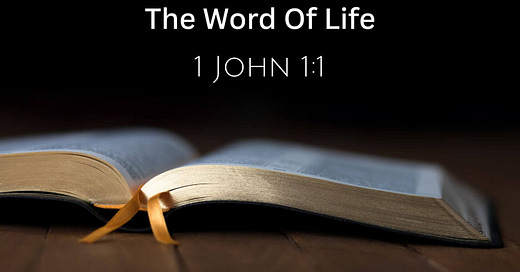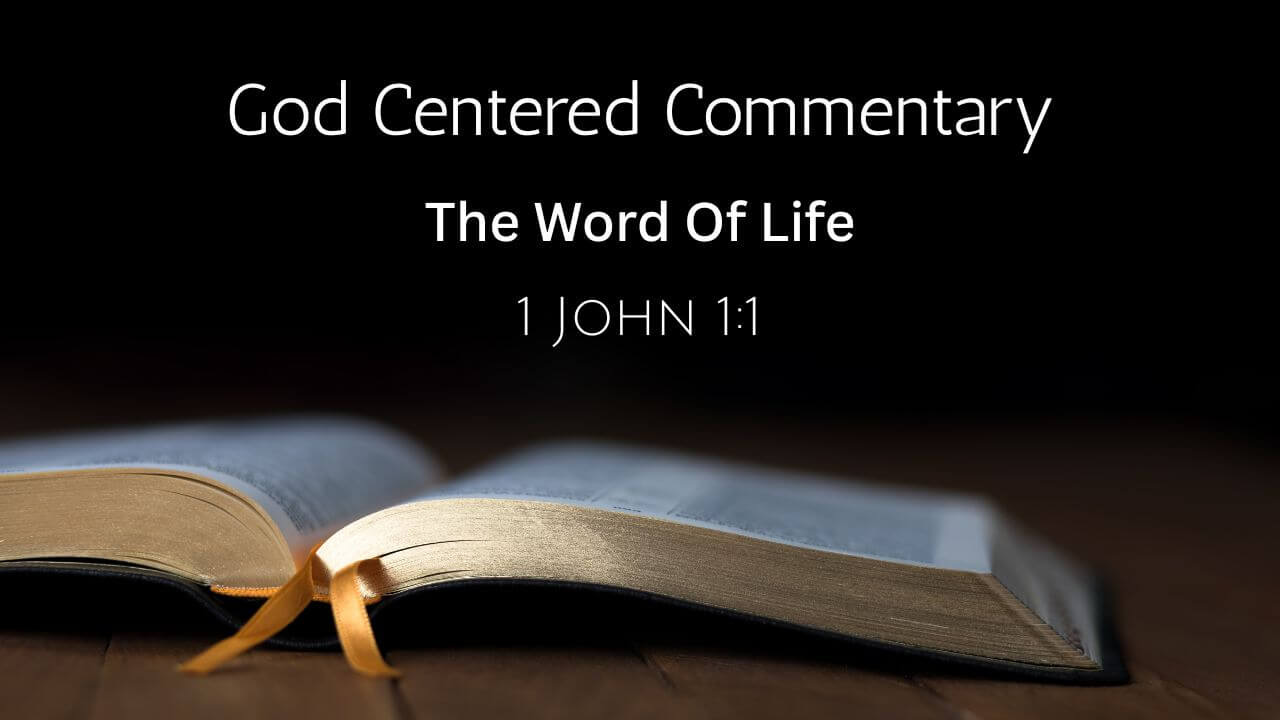God Centered Commentary - 1 John 1:1 - The Word Of Life
From the outset, John is clear that authentic Christianity involves a real experience with the living God and that Jesus was not a figment of their imagination. He was truly God in real human flesh.
The epistle of 1 John is one of my favorite books in the entire Bible. In it, we learn specifically what Authentic Christianity looks like. It has often been said that when teaching someone how to spot check fraud, they do not study all the possible fraudulent checks. No, they study what the real thing looks like, and then it is easier to spot a counterfeit.
Such is the case with John’s first epistle. He outlines legitimate and authentic Christianity so that error is easier to spot. I won’t spend much time getting into the background of the epistle, as many faithful men have already done so before me.
Before diving into the study, I want to say that I believe 1 John was written before the events of 70 A.D. The later date seems to be assumed in Christian circles, but I do not believe this to be the case.
When you study written works about the dating of Scripture, you find that those books assumed to be written after 70 A.D. have plenty of external evidence to suggest they were written before 70 A.D. Further, the external evidence regarding the dating of these books is not as definitive to one side or the other as we may prefer.
In light of this, we must lean heavily on the internal evidence to support our views. Upon viewing the internal evidence, I believe it is far more likely for an earlier date for all of Scripture, and in particular, 1 John.
Internal Evidence Examples
If the epistle were written after the events of 70 A.D., one would expect some mention of these events in any of John’s epistles.
If the Gospel of John were written after the events of 70 A.D., one would expect some mention of these events in the gospel since the Gospel of John is largely assumed to have been written after 70 A.D.
If all of John’s books were written after 70 A.D., why does John refer to himself as a fellow partaker in the tribulation in Revelation 1:9?1
Every one of John’s “time-markers” in his written works suggests a date near his time for the events he does describe.2
More could be said about the internal evidence, but this will suffice for now.
The Word Of Life - 1 John 1:1
What was from the beginning, what we have heard, what we have seen with our eyes, what we beheld and touched with our hands, concerning the Word of Life.
(1 John 1:1 LSB)
The first thing we see about authentic Christianity is that the disciples are not giving a made-up account of what transpired. It is not a fictional story. These were very real events, and they all heard, saw, and beheld.
Word Study
Beginning - This word is not referencing the “beginning” in terms of the beginning of time or the beginning of creation. This word can mean that, but we also have to consider the context in which a word is used. When this word is used in the first verse of John’s gospel, I believe he is referencing the beginning of time to say that Jesus was there. However, here in 1 John, the focus is on Jesus’ earthly ministry and validating it. I think the use of the word “beginning” here is about the beginning of Jesus’ earthly ministry when He called His disciples and began to teach them all that He did.
Heard - to hear, to listen, to understand. This involved comprehension. They not only heard what Jesus taught with their ears, but they understood and comprehended it.
Seen - to look, see, experience, perceive, discern. This action involved the physical act of using their eyes to see, and also is a claim to an actual experience. This was not made up in their minds but seen and experienced with their eyes.
Beheld - gazed upon, viewing attentively, to contemplate with deep thinking. They were not just passers-by when it involved Jesus. They spent every day with him. The disciples were students of Jesus. They watched him with the intent of learning from Him. This was not a surface-level understanding. The things they learned affected the core of who they were.
Touched - handled, feel after. This is very similar to what we would say today in regard to authenticating something. It is common today to say something like, “I can guarantee you this is the truth because I not only saw it I put my hands on it.”
From the outset, John is clear that authentic Christianity involves a real experience with the living God and that Jesus was not a figment of their imagination. He was truly God in real human flesh. One of the heresies that has plagued the church is those who attempt to claim that Jesus merely looked like a man but was not a real man. John dispels all that heretical garbage right from the beginning of his epistle.
Jesus Christ - The Word Of Life
Finally, to end this first verse, John stated that the person they heard, saw, beheld, and touched was none other than who he calls “The Word Of Life.” This is identified in this epistle and John’s Gospel as Jesus Christ. There is no question that John is writing about Jesus Christ, the Son of God. He is the Word. He is the Word of Life because He is the one who brings eternal life to mankind.
I, John, your brother and fellow partaker in the tribulation and kingdom and perseverance which are in Jesus, was on the island called Patmos because of the word of God and the witness of Jesus. (Revelation 1:9 LSB)
The Revelation of Jesus Christ, which God gave Him to show to His slaves the things which must soon happen; and He indicated this by sending it through His angel to His slave John, who bore witness to the word of God and to the witness of Jesus Christ, even to all that he saw. Blessed is he who reads and those who hear the words of the prophecy and keep the things which are written in it, for the time is near. (Revelation 1:1-3 LSB)






Good job Andy on sharing about 1st John. For me I see John’s protectiveness and love on display for the people of God.